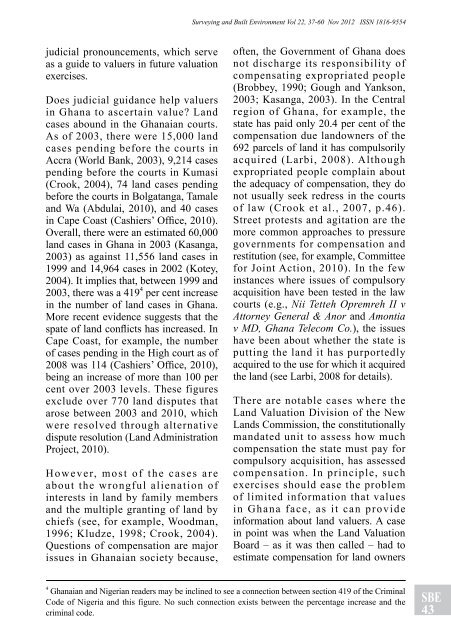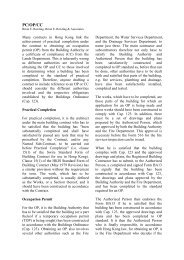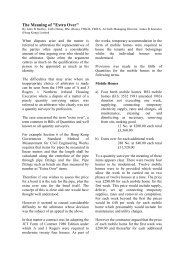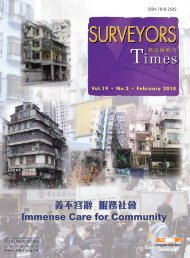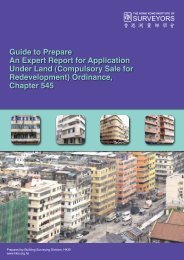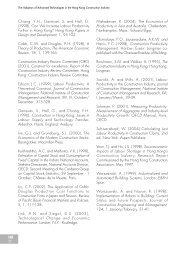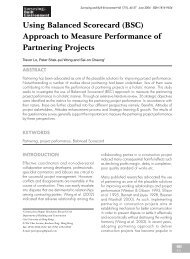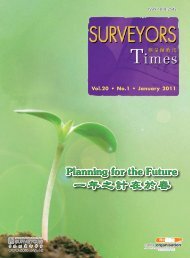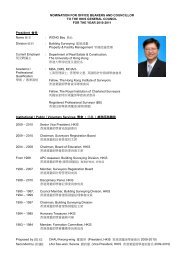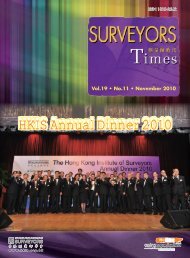Surveying & Built Environment Vol. 22 Issue 1 (December 2012)
Surveying & Built Environment Vol. 22 Issue 1 (December 2012)
Surveying & Built Environment Vol. 22 Issue 1 (December 2012)
You also want an ePaper? Increase the reach of your titles
YUMPU automatically turns print PDFs into web optimized ePapers that Google loves.
judicial pronouncements, which serve<br />
as a guide to valuers in future valuation<br />
exercises.<br />
Does judicial guidance help valuers<br />
in Ghana to ascertain value? Land<br />
cases abound in the Ghanaian courts.<br />
As of 2003, there were 15,000 land<br />
cases pending before the courts in<br />
Accra (World Bank, 2003), 9,214 cases<br />
pending before the courts in Kumasi<br />
(Crook, 2004), 74 land cases pending<br />
before the courts in Bolgatanga, Tamale<br />
and Wa (Abdulai, 2010), and 40 cases<br />
in Cape Coast (Cashiers’ Office, 2010).<br />
Overall, there were an estimated 60,000<br />
land cases in Ghana in 2003 (Kasanga,<br />
2003) as against 11,556 land cases in<br />
1999 and 14,964 cases in 2002 (Kotey,<br />
2004). It implies that, between 1999 and<br />
2003, there was a 419 4 per cent increase<br />
in the number of land cases in Ghana.<br />
More recent evidence suggests that the<br />
spate of land conflicts has increased. In<br />
Cape Coast, for example, the number<br />
of cases pending in the High court as of<br />
2008 was 114 (Cashiers’ Office, 2010),<br />
being an increase of more than 100 per<br />
cent over 2003 levels. These figures<br />
exclude over 770 land disputes that<br />
arose between 2003 and 2010, which<br />
were resolved through alternative<br />
dispute resolution (Land Administration<br />
Project, 2010).<br />
However, most of the cases are<br />
about the wrongful alienation of<br />
interests in land by family members<br />
and the multiple granting of land by<br />
chiefs (see, for example, Woodman,<br />
1996; Kludze, 1998; Crook, 2004).<br />
Questions of compensation are major<br />
issues in Ghanaian society because,<br />
<strong>Surveying</strong> and <strong>Built</strong> <strong>Environment</strong> <strong>Vol</strong> <strong>22</strong>, 37-60 Nov <strong>2012</strong> ISSN 1816-9554<br />
often, the Government of Ghana does<br />
not discharge its responsibility of<br />
compensating expropriated people<br />
(Brobbey, 1990; Gough and Yankson,<br />
2003; Kasanga, 2003). In the Central<br />
region of Ghana, for example, the<br />
state has paid only 20.4 per cent of the<br />
compensation due landowners of the<br />
692 parcels of land it has compulsorily<br />
acquired (Larbi, 2008). Although<br />
expropriated people complain about<br />
the adequacy of compensation, they do<br />
not usually seek redress in the courts<br />
of law (Crook et al., 2007, p.46).<br />
Street protests and agitation are the<br />
more common approaches to pressure<br />
governments for compensation and<br />
restitution (see, for example, Committee<br />
for Joint Action, 2010). In the few<br />
instances where issues of compulsory<br />
acquisition have been tested in the law<br />
courts (e.g., Nii Tetteh Opremreh II v<br />
Attorney General & Anor and Amontia<br />
v MD, Ghana Telecom Co.), the issues<br />
have been about whether the state is<br />
putting the land it has purportedly<br />
acquired to the use for which it acquired<br />
the land (see Larbi, 2008 for details).<br />
There are notable cases where the<br />
Land Valuation Division of the New<br />
Lands Commission, the constitutionally<br />
mandated unit to assess how much<br />
compensation the state must pay for<br />
compulsory acquisition, has assessed<br />
compensation. In principle, such<br />
exercises should ease the problem<br />
of limited information that values<br />
in Ghana face, as it can provide<br />
information about land valuers. A case<br />
in point was when the Land Valuation<br />
Board – as it was then called – had to<br />
estimate compensation for land owners<br />
4 Ghanaian and Nigerian readers may be inclined to see a connection between section 419 of the Criminal<br />
Code of Nigeria and this figure. No such connection exists between the percentage increase and the<br />
criminal code.<br />
SBE<br />
43


